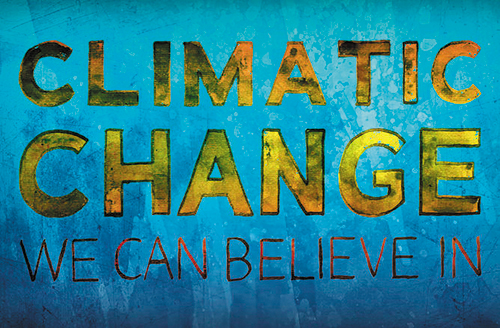

One has to understand to believe either way.
The report released jointly by the Royal Society in the U.K. and the U.S. National Academy of Sciences provides a guide to current climate change science for a non-scientific audience.
In this respect it is an interesting undertaking by two of the world’s most eminent scientific bodies, and the latest effort to try and communicate the science and uncertainty behind what we understand about climate change and its potential effect on the planet to the general public.
But the verdict has been mixed, with some saying the language is still too complex, while others argue that by eliminating much of the detail the report puts forward a stronger position than the evidence supports.
The comparatively brief 34-page report, “Climate Change: Evidence And Causes,” was drawn up by a team of 12 scientists on both sides of the Atlantic. The authors of the report set out to tackle the major questions frequently raised to scientists working in the field.
One of the authors, John Shepherd, research fellow in earth system science at the University of Southampton, said it was felt that the report from the Intergovernmental Panel on Climate Change (IPCC) in September needed to be expressed in a way that was more accessible.
The use of a question and answer format was deliberate. “One of the problems of science communications is that it tends to be us scientists telling people things and expecting them to just receive it,” Professor Shepherd explained. “We felt a question and answer document, if we got the right questions, would feel more like a conversation.” Further discussion is encouraged through the option to ask questions of scientists which will be answered through the website.
Among the report’s chapters are topics that are lightning rods for those skeptical of climate change. For example the significance of carbon dioxide, the role of the Sun’s heating of the Earth, shrinking Arctic ice vs. growing Antarctic ice, the temperature increase required to bring about substantial climate change and the speed at which it may happen.
Professor Shepherd said: “These were chosen to try to answer the targets of climate change skepticism. Many of us involved in the report often lecture and give talks, and these were culled from the questions that are those most frequently asked.”
But one of the issues identified was that people tend to form their views along ideological lines rather than by presented with evidence. This was a problem across the spectrum of environmental topics, he said: “In the U.S. particularly, it is such a politically polarized issue that it is almost impossible for someone to admit being both a Republican and believing in climate change. It’s a situation we’ve managed to avoid in the U.K. so far.”
As it happens, last week saw the launch of a transatlantic coalition of personalities from the right of center, including actor Arnold Schwarzenegger, businessman and engineer Sir James Dyson and businessman and former mayor of New York, Michael Bloomberg, arguing that the anti-environmentalist stance of the right was enormously damaging to business, political parties, and the planet.
[Referring specifically to England] Professor Shepherd said: “It’s a serious and now quite long-standing problem, not helped by the broadcast media who for example insist on giving equal time to [former chancellor of the exchequer] Nigel Lawson’s views on climate change as to [chairman of the Grantham Institute for Climate Change] Sir Brian Hoskins. It’s the equivalent of giving equal time to candidates from the Monster Raving Loony Party during a general election—which they would never do,” he added.
Associate professor of sociology at Warwick University Eric Jensen, who studies public engagement with science, said the report was frequently well phrased and well balanced, but still infused with a lot of jargon. What the report got across was the range of different sources of evidence: “It’s not just a poll of scientists’ opinions, with the implication that we should just believe them,” Jensen said. “The underlying message is that there are many, many indicators. And while this has been said many times, I suspect this will be something that has to be said again and again.”
Judith Curry, chair of the School of Earth and Atmospheric Sciences at the Georgia Institute of Technology, and a scientist known for her skeptical views on climate change, wrote that although the report “scores points” for readability compared to the “turgid prose” of the IPCC reports, it failed in its aim to “make clear what is well established, where consensus is growing, and where there is still uncertainty.” The report, she says, provides “overconfident answers” while giving the topic of uncertainty only a “superficial” treatment that “will reinforce the public distrust of ‘establishment’ assessments of climate science.”
Jensen said the media’s representation of the climate debate hides the fact that that not everyone has taken sides: “You’d get the impression that people have made their minds up, but among the public there is still a large number of people yet to make their mind up,” Jensen said.
And even among those that disagreed there are many points accepted by both. “It’s possible that positions aren’t as far apart as they appear.” Which means the appetite for, and use for, reports like this will continue.
The Conversation is funded by the following universities: Aberdeen, Birmingham, Bradford, Bristol, Cardiff, City, Durham, Glasgow Caledonian, Goldsmiths, Lancaster, Leeds, Liverpool, Nottingham, The Open University, Queen’s University Belfast, Salford, Sheffield, Surrey, UCL and Warwick. It also receives funding from: Hefce, Hefcw, SAGE, SFC, RCUK, The Nuffield Foundation, The Wellcome Trust, Esmée Fairbairn Foundation and The Alliance for Useful Evidence
By Michael Parker Environment and Energy Editor at The Conversation













